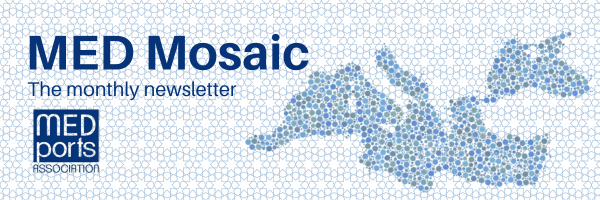Issue 14
HOT SEAT:
Interview with Mr. Minas Papadakis, CEO of Port of Heraklion
Insights on Heraklion Port, and the Future of Crete’s Maritime Industry

Issue 14
HOT SEAT:
Interview with Mr. Minas Papadakis, CEO of Port of Heraklion
Insights on Heraklion Port, and the Future of Crete’s Maritime Industry
The seminar successfully highlighted the importance of collaboration among island ports in the Mediterranean. One of the key outcomes was the establishment of a framework for sharing best practices related to sustainable operations and innovative port management. Participants engaged in fruitful discussions on optimizing logistics, enhancing service quality, and boosting regional economic growth, ultimately fostering stronger partnerships among the ports.
The cruise industry serves as a vital economic engine for Crete and Heraklion. Beyond the immediate financial impact, such as port fees and passenger spending, it significantly boosts local businesses in tourism, hospitality, and retail sectors. The influx of visitors helps to diversify our economy, creating job opportunities and promoting cultural exchange. Moreover, the enhanced visibility from hosting major cruise lines strengthens Crete’s reputation as a premier tourist destination.
Heraklion port is pivotal for the economic stability and growth of Crete. It acts as a critical gateway for goods, facilitating trade and commerce not only with the mainland but also with international markets. The port’s strategic location enables us to support both passenger and freight transportation, thus enhancing connectivity. This connectivity is essential for attracting investment and fostering tourism, contributing directly to the island’s overall prosperity.
My background in the financial sector has equipped me with a robust understanding of financial management, risk assessment, and strategic planning. These skills are invaluable in navigating the complex financial landscape of port operations. They enable me to implement cost-effective measures, optimize resource allocation, and identify growth opportunities. By applying financial principles, we can ensure that the port operates sustainably while maximizing its economic impact on the region.
With Grimaldi as the main shareholder of the port, I anticipate a collaborative approach that emphasizes green development and sustainability. Grimaldi’s commitment to eco-friendly practices aligns with our vision for a sustainable port. I expect this partnership to drive significant investments in green technologies and initiatives, such as reducing emissions, improving energy efficiency, and enhancing waste management practices. Together, we can position Heraklion as a model for sustainable port operations in the Mediterranean, contributing to a greener future for our community and the environment.